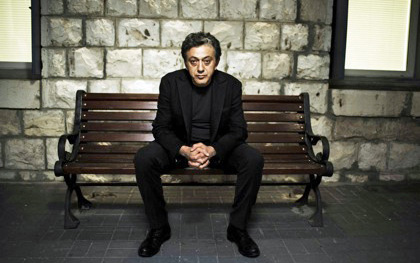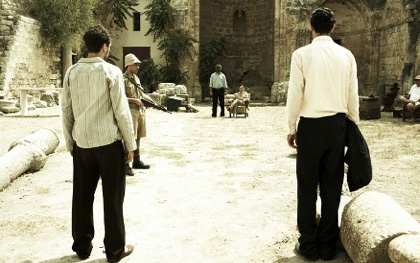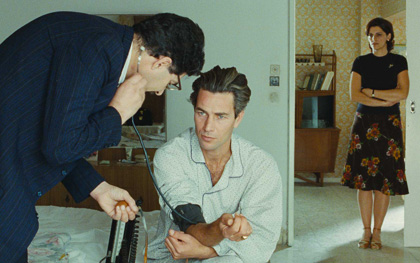Interview
Elia Suleiman: the strong silent type

Ali Jafaar interviews Elia Suleiman, the contradictory talent whose ‘The Time That Remains’ is a highly personal closing to his sweeping historical Palestinian trilogy
» Read Adania Shibli's analysis of The Time That Remains
Tragic elements pervade The Time That Remains. The third part of Elia Suleiman’s trilogy, which began with Chronicle of a Disappearance (1996) and Divine Intervention (2002) and charts the story of Palestinian dispossession and displacement since 1948, is his most ambitious effort to date. Beginning in 1948 on the day his hometown of Nazareth officially surrendered to the Israeli army and continuing through to the most recent Intifada, the film artfully interweaves the personal and the political. Suleiman even used his own parents’ diaries for inspiration while writing the screenplay.
Suleiman is something of a contradiction. The 49-year-old is, along with Paradise Now director Hany Abu-Assad, the most prominent Palestinian director working today, yet he has only made three features. In person, he is famously loquacious and mischievous, while on screen he has studiously developed a near-silent persona, his deadpan gaze at events before him a subtle testament to the frequent absurdity of the Palestinians’ plight.
While raising independent financing for any project is never easy, particularly one dealing with as contentious a political subject as the Palestinian-Israeli conflict, Suleiman had to contend with an unusual amount of obstacles this time. In 2007, with production only weeks away, Suleiman saw the project’s original financing collapse at the last minute. He spent the next few months fruitlessly trying to raise the necessary money before salvation came in the form of London-based Saudi entrepreneur and film enthusiast Hani Farsi, as well as respected French film sales company Wild Bunch.
The Time That Remains is unquestionably Suleiman’s masterpiece. With a lean running time of 110 minutes, the film skilfully veers between absurdist sketches and scenes of emotional poignancy. In one moment, a Palestinian youth leaves his house, oblivious to the Israeli tank stationed directly at his door. As the youth talks on his mobile, aimlessly moving from side to side, the tank’s oversized gun barrel tries to keep up with his every moment. The mechanical wheezing of the tank becomes comically over-exaggerated as the youth continues his mundane conversation before returning inside. Elsewhere, scenes of Suleiman visiting Nazareth to look after his aging mother – their encounters played out without any dialogue – are almost unbearably moving.
Suleiman’s triumphant return (it is seven years since Divine Intervention was released) coincides with a renaissance in Palestinian film-making. In recent months, film-makers such as Annemarie Jacir, Najwa Najjar, Sameh Zoabi and Scandar Kopti have all emerged to make their first feature films. Tawfiq Abu-Wael – whose auspicious 2004 feature debut Thirst garnered plenty of critical kudos – is also reputedly hard at work on his sophomore project Tanathor.
Suleiman spoke to Sight & Sound about the experience of making his third, and best, film to date.

Ali Jafaar: ‘The Time That Remains’ is more outwardly expansive than your previous films, yet you manage to retain much of your earlier use of silence and stillness. How did you balance these elements?
Elia Suleiman: The challenge was to say a lot with a little, as in a haiku poem, where only a few words are used. The words are very understandable, such as ‘sun’ or ‘light’. You have the democratic space to read the simplicity that is being offered to you and to enter further into another layer of meaning – in the most successful cases, to infinity.
I try to avoid singular metaphors. I try to avoid references that have only linear narrative. I am inexpressive in my films for the same reason: if I start to express myself then I am simply putting my dramatic reactions in there, which is something I do not wish to do, because you need to give the spectator space to see what they want and to see with marginal narrative guidance. This is where, I think, the spectator is able to gain the pleasure of co-participating and realise the inner emotion that she herself feels. A lot of of what we feel in this film is not necessarily expressed on the faces of the people who are engendering it: it is expressed in an interior fashion. I think there is an intimate complicity between the spectator and this inner emotion. You might giggle at a humorous moment, or it might produce the solitude of a tear. The response is something quite intimate and personal. I would like to keep it that way.
This is a very personal, autobiographical film. You used, for example, your father’s diary as source material. How did you manage to keep an objective distance from this subjective history?
That was the challenge, to tell you the truth. I thought about it a lot when I was writing the script. I did not want to fall into an epic genre even though this is in many ways an epic film. I wanted to maintain – and to see if I could succeed in maintaining – a very static, tense frame with a tableau-like theatricality while retaining the historical feel of the film.
I decided not to enter into what makes up a lot of the epic films: the sensationalism, the bombastic and predictable scenes. I wanted to remain completely unpredictable and yet tell something specific about the period. Each episode is, in some respects, a film within itself. Each episode is related to the following one, so repetition is a risk to be taken to, for example, remind the viewer that the person now falling apart as an old man is the same person who was stubbornly holding his stained gun as a youth. To create that kind of association through minimal information was another challenge.
How did you pick which episodes or which incidents to portray? For example, the film doesn’t show the events or aftermath of the 1967 Arab-Israeli war.
For me, it would have been very predictable to go into 1967 and the Six-Day War. I wanted to hit on tones that are usually on the margins, and there are those who will make the connections with better-known aspects of Palestinian history. To go to the centre of this narrative would have been an easy target, and I do not like easy routes. I want to challenge myself all the time in order to reach the moment of surprise.
I didn’t have a strategy, but I knew for sure when I wrote the script that I would start the film with an image of surrender. That was precise.
What’s interesting is that when you play yourself in the movies it is a stylised version of you, whereas anybody who knows you would attest that you don’t stay silent too long.
You’re wrong. In fact I spend most of my life in silence. I am a silent observer. I can sit dreaming for seven or eight hours, static. The onscreen silence fits how I spend a lot of my time. What is stylised is the posture, because it is an image and you have to take care to achieve an unexpressive pose. Silence is a model of living, but it is not necessarily what you see of me when I am talking. I have these two extremes. I am not just an artist who is hypersensitive and timid, I am also somebody who is cares about politics, philosophy, concepts and the intellectual and conceptual strata. Not wanting to sound pompous – somebody once said that I was an intellectual who makes movies. I think there is a bit of truth in that.

Describe the experience of directing somebody playing your father, mother and even a younger version of you?
It was a new experience for me. A lot of things were new to me because I am not exactly somebody who has made a lot of feature films. I still don’t have a lot of experience in cinema and film-making. Somehow, fortunately, I matured making this film – and it’s still only my third.
It was difficult to direct a child at the start. I chose him without auditions. He was a kid from Nazareth who looked like me. It was the same with the teenager. I simply hid my insecurity in directing this child. Saleh Bakri, who plays my father, is a professional actor. He has amazing intuition. He feels the things [he portrays]; I did sit with him and talk about my father. What he did, which was fairly fascinating, was to go into town and meet a lot of people who knew my father, and sit for hours listening to them, as well as listening to me and looking at photos and chronicles. I started to guide him on my father’s tics: for example, when Olga arrives, the looks and embarrassment at the breakfast table, and the humour my father had. He managed it perfectly.
How do you see this film in relation to the first two? Do you view them as a complete trilogy?
I’ll say yes, but only rhetorically at the moment. I need a few months to conclude this question; I might have said this film ends something at some point, but it might have been promotional sloganism. I didn’t know that I was making this film until I looked at it. I didn’t know the totality of it. I don’t think that I can be a spectator of the film now. Perhaps in six months or a year I might sit with you and have critical things to say about it. I am not in that position yet.
The film had a very troubled production history.
I keep thinking I should jot down in my mind some of things that have been done to these films by people who seem to be their guardians, but in reality are something else.
A lot of film-makers go through exactly the same experience. There is a system that consciously functions to maintain its own power. It’s a disturbing phenomenon, since this system was created, I believe, for student film-makers, for people who want to make films. Without wanting to cast myself as the victim, since I have managed pretty well, I think people should know what a director has to go through.
This film was not only crushed before it was made, there was an attempt to kill it entirely. Even when they decide not to finance you, there’s a level of overkill – they try to ensure the film will not be made at all. This is quite dangerous. These people who are the natural inheritors of bourgeois society have a liberal façade but inside are quite racist. They are the people who rule the show.
However, this is not what is important now because we have made the film. This topic must stand on the side and wait for a moment of tranquility – the difficulty of making a film should be written about and read with a lot of space and tenderness, not aggression, despite its tragic element.
Do you think this is your most subversive film?
I don’t make subversive films. This is a term that stuck to me because I am Palestinian. When you are Palestinian it is easier for people to say you are subversive. I don’t think that there is anything subversive about a movie where a family takes a certain route that is both personal and intimate.
Nor is there anything cruel in it, apart from the cruelty of life in a certain locale. What I show in the film is history. It is fact. It is not subversive at all. The Arab Liberation Army, who were supposed to protect the Palestinians, ended up begging for food from the houses of villagers they were coming to protect. They were sent to fight without ammunition. They were a burden on the Palestinian villagers. If we’re still debating what Israel did to Palestine then something is wrong.
Sixty years after the fact, we’re still saying they did not destroy Palestine, they did not expel people, they did not execute, rape and massacre Palestinians. I cannot believe that we still have to debate such an issue. It is evident in every centimetre of Palestine. Similarly, what the Arab countries did at that moment, making deals with the colonial powers – including the ‘Zionist entity’, as some of them still call it today – is not up for debate. They make a lot of noise, but in the end all they have done is maintain the status quo.
‘The Time That Remains’ is released on 28 May, and reviewed by Philip Kemp in the June 2010 issue of Sight & Sound.
» Read Adania Shibli's analysis of The Time That Remains
See also
Palestine: invisible lands: Adania Shibli on London’s 2010 Palestine Film Festival (online, April 2010)
Not forgotten: Adania Shibli on Sarah Wood’s For Cultural Purposes Only and the lost Palestinian Film Archive (online, November 2009)
Bomb culture: B. Ruby Rich on Hany Abu-Assad’s Paradise Now (April 2006)
Paradise Now reviewed by Ali Jafaar (May 2006)
